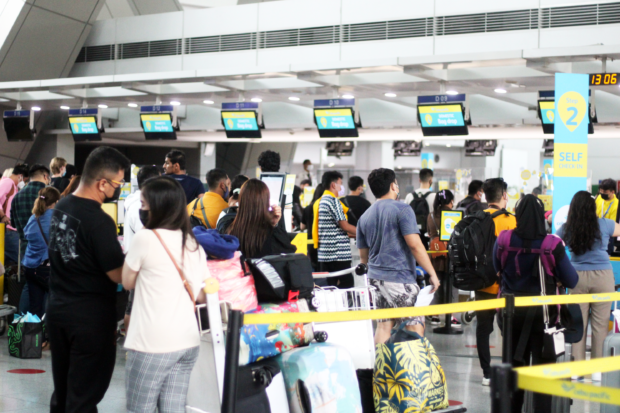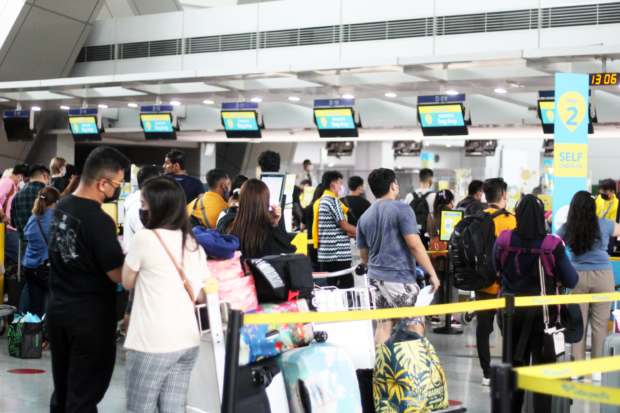
Travelers arrive at the Ninoy Aquino International Airport (NAIA) Terminal 3 in this file photo taken in November 2022. INQUIRER file photo / SAMUEL YAP
MANILA, Philippines — More documents will be needed by Filipinos traveling abroad to comply with new stricter travel regulations.
The Inter-Agency Council Against Trafficking (IACAT) is set to implement its revised guidelines for the departure of Filipinos traveling abroad starting September 3.
In a recent statement, the IACAT explained that it has revised the departure protocols during the 58th Regular Council Meeting to “combat the grave menace of human trafficking.”
“It is of paramount importance to emphasize that the Revised Guidelines have been formulated not to encroach upon the fundamental right to travel, but to serve as a protective bulwark shielding our fellow citizens from the dire perils of human trafficking,” said IACAT.
“IACAT ardently anticipates that the enforcement of these meticulously refined Guidelines, complemented by an enhanced regime of information dissemination, will effectuate a palpable reduction, if not outright elimination, of human trafficking incidents,” it added.
Based on the revised guidelines, basic documents needed to travel abroad now consist of the following:
- Passport, valid at least six months from the date of departure;
- Appropriate valid visa, whenever required;
- Boarding pass;
- Confirmed return or roundtrip ticket, when necessary
In addition to the inspection of basic travel documents, the immigration office (IO) may then require the traveler to answer clarificatory questions as well as ask passengers for the following supporting documents:
For tourists going abroad
1. Self-funded Travels
- Confirmed return or roundtrip ticket;
- Proof of hotel booking/accommodation;
- Financial capacity or source of income consistent with the passenger’s declared purpose of travel;
- And proof of employment and other equivalent documents.
- For sponsored travels:
2. If the sponsor abroad is a relative within the first (1st) civil degree of the passenger
- Original Philippine Statistics Authority (PSA)-issued birth certificate/report of birth or marriage certificate/report of marriage as proof of first (1st) civil degree relationship;
- Confirmed return or roundtrip ticket; and
- Copies of the following documents of sponsor, such as: Valid passport; Valid work visa/permit, residence permit or any equivalent document; Overseas Employment Certificate (OEC), E-receipt, or OFW Clearance, for OFW sponsors.
2.2. If the sponsor abroad is a relative up to the fourth civil degree of consanguinity or affinity, unless otherwise limited by the Philippine Embassy or Consulate exercising jurisdiction
- Original Affidavit of Support and Guarantee (AOSG) and is:
-duly notarized by the Philippine Embassy/Consulate/Honorary Consulate authorized to perform notarization services; or
-if the AOSG is notarized by a local notary public in the country of destination, the AOSG must be duly authenticated by the Philippine Embassy/Consulate/Honorary Consulate (for non-Apostille countries) or apostilled by the apostille authority in the country of destination (for Apostille countries).
- Confirmed return or roundtrip ticket; and Original PSA-issued birth certificate/report of birth or marriage certificate/report of marriage showing the exact relationship between the passenger and the sponsor.
2.3. If the sponsor abroad is a non-relative or a legal/juridical entity
- Original Affidavit of Support and Guarantee (AOSG) and is:
-duly notarized by the Philippine Embassy/Consulate/Honorary Consulate authorized to perform notarization services;
-or if the AOSG is notarized by a local notary public in the country of destination, the AOSG must be duly authenticated by the Philippine Embassy/Consulate/Honorary Consulate (for non-Apostille countries) or apostilled by the apostille authority in the country of destination (for Apostille countries)
- Substantial proof of relationship;
- Confirmed return or roundtrip ticket; and
- if a legal/juridical entity, registration papers of the sponsor.
2.4. If traveling with a local sponsor
- Duly notarized affidavit executed by the local sponsor
- Substantial proof of relationship11:
- Copy of the sponsor’s return ticket consistent with that of the passenger
For Overseas Filipino Workers (OFWs)
1. OFWs Departing for the First Time
- OEC, E-receipt, or OFW Clearance duly issued by the Department of Migrant Workers (MW) as appearing in the Border Control Information System (BCIS);
- Valid and appropriate employment visa or work permit or any equivalent document;
- Employment contract, as necessary; and
- Visa Usage Undertaking13 or Manpower Request specifying visa usage approved or verified by the Migrant Workers Office (MWO), if applicable.
2. Balik-Manggagawa
- Valid and appropriate employment visa/work permit or any equivalent document;
- OFW Clearance, OEC issued on-site by the MWO or by the DMW or Migrant Workers Airport Assistance Center (MWAAC), or Online BM OEC Exemption or manually issued OEC:
- And Proof of employment, as necessary.
3. Direct-Hire
- OEC, E-receipt, or valid OFW Clearance; and
- Proper and valid work visa/work permit or any equivalent document.
4. OFWs Requiring Special Travel Exit Clearance in lieu of OEC
- Locally employed seafarers (conduction crew) who will be manning a Philippine Registered Ship’s conduction from a foreign port to the Philippines;
- Seafarers who will undergo orientation and other analogous circumstances as a requirement before their employment, as the prospective foreign employer prescribes. The foreign employer must be accredited by a licensed local manning agency; and
- Emergency change crew for Philippine registered vessels docked in international ports.
5. OFWs traveling to other countries during their vacation in the Philippines
- If the OFW will travel to other country/ies for tourism, but will return to the Philippines before proceeding to his/her jobsite, the OFW shall undergo the usual immigration inspection for tourist travelers under this Guidelines.
- If the OFW will travel to other country/ies for tourism, but will proceed directly to his/her job site, a valid OEC will be required.
6. Endorsement to the DMW-MWAAC
- The IO shall promptly endorse a passenger to the DMW-MWAAC for validation of employment documents, updating of employment records, issuance of clearance, or other appropriate action, when confronted with the following:
the OEC of the OFW or MWO-registered worker is invalid, expired, used, or did not reflect in the BCISl; or
the OFW has incomplete or questionable documents. - In cases of endorsement to the DMW-MWAAC, the IO shall provide the passenger with a validation request form. Upon validation by the DMW-MWAAC, the passenger shall be directed back to the I0 for the completion of the immigration inspection.
Inspection
The primary IO will then defer the departure of a passenger if he or she presents fraudulent, falsified or tampered travel or supporting documents, or refuses to undergo primary inspection.
The IO will refer the following passengers for secondary inspection:
- Those who failed to establish their purpose of travel during primary inspection
- Those with inconsistent or insufficient travel or supporting documents
- Those unable to show proof of financial capacity to travel and are accompanied by a foreign national who is not a relative by consanguinity or affinity up to the fourth civil degree
- Those traveling, with or without a visa, to countries under Alert Level 3 or 4 and those with relevant deployment bans
- Those who previously stayed abroad for over six months as a tourist or previously misrepresented any travel information and are intending to travel again for the same purpose
- Those with active deferred-departure records
- Those identified and reported by the IACAT Anti-Trafficking Task Force or other government agencies as a potentially trafficked or illegally recruited person or a suspected trafficker or illegal recruiter
During the inspection, IACAT explained that the secondary IO shall consider “the totality of the circumstances of the passenger which includes, but is not limited to, the purpose of travel, country/ies of destination, duration of stay, travel history, age, financial capacity or source of income consistent with the passenger’s declared purpose of travel, and educational background.”
The secondary IO will defer the departure of the passenger upon a finding of any of the following grounds:
- Refusal to undergo secondary inspection
- Doubtful purpose of travel
- Inconsistent or insufficient travel or supporting documents
- Misrepresentation or withholding of material information about the travel
- Presentation of fraudulent, falsified, or tampered travel or supporting documents
- Non-compliance with previous deferred-departure requirements
- Passenger is a potentially trafficked or illegally recruited person, or a suspected trafficker or illegal recruiter
RELATED STORIES
IACAT-MCIAA urged to conduct anti-human trafficking activities
Traveling Abroad? You might want to check your host country’s immunization requirements
Visiting Singapore for first timers
Eligible Filipinos may now travel to Canada visa-free
